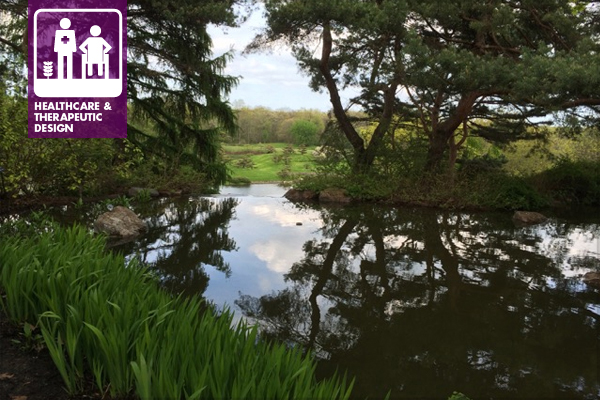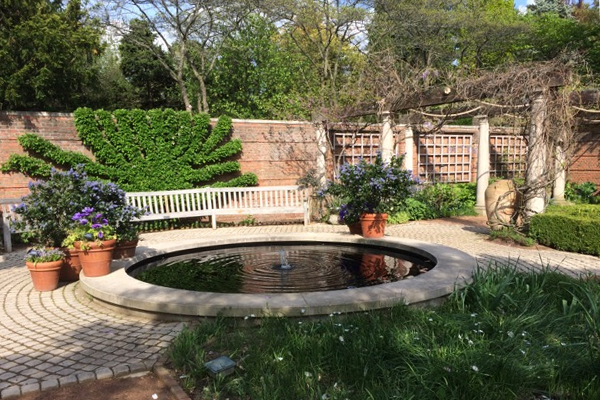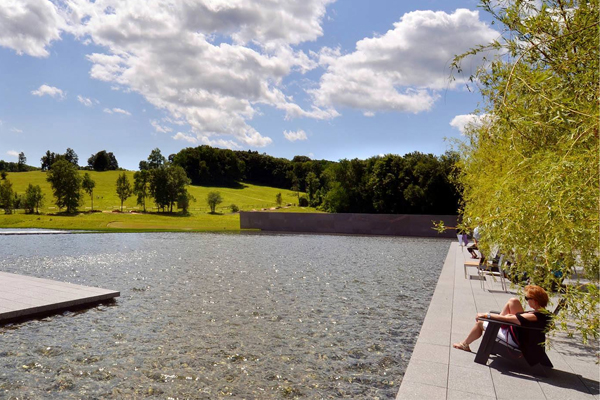Work as it appears on screens large & small (& little sound waves).
Links to some radio, podcast, TV & film interviews. Also check out my IMDb filmography.
American Society of Landscape Architects
Posted on Apr 14th, 2016
image: Jack Carman
Blue Mind: The Surprising Science That Shows How Being Near, In, On, or Under Water Can Make You Happier, Healthier, More Connected, and Better at What You Do
Wallace J. Nichols
2015
When I heard writer and sea turtle expert Wallace J. Nichols speak in Sausalito last summer, I was delighted by how much of what he said resembled the science behind why nature is good for our health and well-being. He quoted much of the same research we landscape architects do when promoting healthcare and therapeutic gardens. I knew I had to read his book, and I was amazed by the range of information that he brings together as both a scientist and an unabashed ocean lover in his book Blue Mind.
Blue Mind is an enjoyable read about the numinous experience of water, coupled with an urgent message to wake up to what is ‘hidden in plain sight’ in the hopes that we humans can transform the way we treat our planet’s resources. Nichols shares a strong emotional connection to this liquid element, as do many people who are willing to pay a lot of money to travel to beautiful beaches for vacations and spend top dollar for the house with a view of the water. For those of us who are curious to know what’s up with that from a scientific evidence point of view, this book explains the psychology and physiology of why we want and need the benefits associated with spending time in the presence of water.
In Blue Mind, Nichols makes an appeal to a broad range of people who might not feel convinced that emotion alone is a serious enough reason to cherish and protect this basic resource. He demonstrates the phenomenon of how people are attracted to water with cultural data, and how we are physically wired to benefit from the symbolism, physicality, color, sound, and essence of water as we encounter it in the environment, citing recent neuroscience studies and plenty of footnotes to point the reader to explore the topic further. Be prepared to dive deep from the comfort of your reading chair.

image: Jack Carman
Filled with anecdotal stories, some highly personal, Blue Mind reminded me of so many of my own encounters with water, especially of playing at the beach as a child. In describing why we love water so much, Nichols says, “It’s only recently that technology has enabled us to delve into the depths of the human brain and into the depths of the ocean. With those advancements our ability to study and understand the human mind has expanded to include a stream of new ideas about perception, emotions, empathy, creativity, health and healing, and our relationship with water.”
Wallace uses the term ‘Blue Mind’ to describe “a mildly meditative state characterized by calm, peacefulness, unity, and a sense of general happiness and satisfaction with life in the moment. It is inspired by water and elements associated with water, from the color blue to the words we use to describe the sensations associated with immersion.” He demonstrates a correlation between our connection to water with our level of happiness, and how that happiness spills over into our whole lives, not just the time we are connected to (near, in, on, or under) water.

image: Steward Cairns
Chapter Six focuses particularly on the health benefits of getting connected to water. Stress is the most obvious and familiar ailment most of us suffer from, and even though we need some stress to exist, too much stress can literally kill us.
What if we could treat stress, addiction, autism, PTSD, and other ills with surfing or fishing? What if your doctor handed you a prescription for stress or ill health that read, “Take two waves, a beach walk, and some flowing river, and call me in the morning”?
Nichols’ term for too much stress is ‘Red Mind’—“an edgy high, characterized by stress, anxiety, fear, and maybe even a little bit of anger and despair.” This state is normal and useful if we are being pursued by a shark, but too much on a regular basis—like we experience in our fast-paced live—can lead to PTSD and cause or exacerbate the top ten causes of death around the world. There is science that connects these negative health outcomes with the effects on the hippocampus, on our ability to learn and retain new information, and the lowering of dopamine and serotonin—those happy chemicals our bodies produce when we are in the flow.
Another stress producer is multi-tasking, which is apparently more of a back and forth between various tasks than a simultaneous occurrence, as we have learned that the brain processes information serially. It’s interesting to note that, “in 80 percent of car wrecks, the driver was distracted during the three seconds before the collision.” Do not touch that phone! It’s also good to know that the state of ‘continuous partial attention’ we often engage in involves an artificial sense of constant crisis. We are always in high alert when we pay continuous partial attention, and our brain gets bogged down just trying to manage the situation.

image: Bill Timmerman
Sylvia Plath is credited with saying, “There must be quite a few things that a hot bath won’t cure, but I don’t know many of them.” Did you know that there are scientific studies showing how hot baths reduce anxiety, and being around water improves mental health? Personally, I know that a hot shower can get me going in the morning and revive me after a hard day.
Blue Mind offers several examples of using water sports such as kayaking and fly fishing to heal mind and body. For veterans, cancer patients, and drug addicts, the physical, occupational, and mental therapy gives them distraction and a sense of peace and well-being that might be similar to what horticultural therapy offers. Another organization uses surfing to help overcome drug addiction. The endorphins of exercise replace the high of drugs.
There are also many amazing stories of the positive effects of water and water-based exercise on children with autism. Michael Rosenthal, a pediatric neuropsychologist of the Child Mind Institute who works with autistic children, comments, “As a clinician I’m always working with kids to find something that’s going to make them feel happy and safe and secure and relieve their anxiety. But it’s important to note that water in the ocean is therapeutic for a lot of people. I don’t think it’s necessarily an ‘autistic’ thing as much as it is a human thing.” Blue Mind—it’s for everyone!
by Lisa Bailey, ASLA, Healthcare and Therapeutic Design PPN Chair
Read more here.
To post a comment, please login.
View this profile on InstagramDr. Wallace J. Nichols (@wallacejnichols) • Instagram photos and videos
What's New
Rochester Women's Magazine
If You Want To Heal, Find Water
Where did our water come from? One theory is from comets and asteroids nearly 4 billion years... continue
New Trader U
The Science Behind The Ocean's Effect On Our Brain
The ocean has long been a source of fascination and wonder for humans. Its vast expanse, rhythmic waves... continue
Red Bull: Understanding the Blue Mind Theory: How water influences our well-being
Read ahead to learn all about this potential mind-body-water connection.
Red Bull surfer Kai Lenny will take any chance he can get to spend time in the sea. &ldquo... continue
